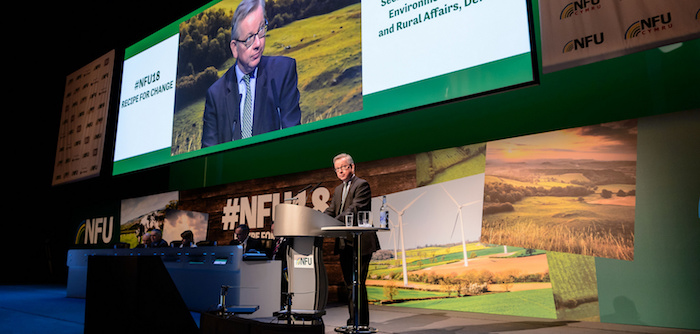Defra Secretary Michael Gove has announced a comprehensive review of farm inspections to ‘remove bureaucratic burdens placed on farmers’.
The review, to be led by Dame Glenys Stacey, will look at opportunities for improving regulation and enforcement pre and post EU Exit, seek out ways to reduce duplication and allow farmers to ‘concentrate on upholding key environmental and animal welfare standards as they produce fantastic British food’.
The current inspection regime can result in farmers being visited by as many as five different bodies – the Rural Payments Agency, Natural England, The Animal Plant and Health Agency, the Environment Agency or their local authority – all asking for similar information.
The review comes as the government is preparing to publish an agriculture Command Paper that consults on future policy in this country after we leave the European Union.
Speaking at the NFU Conference today, Mr Gove said: “The rules associated with current subsidy payments are unwieldy and, very often, counter-productive. They require farmers to spend long days ensuring conformity with bureaucratic processes which secure scarcely any environmental benefits and which, in turn, require a vast and inflexible bureaucracy to police.
“As does the current farming inspection regime, which, despite several recent attempts at simplification, remains as unwieldy as ever. Every year, farmers are confronted by a barrage of inspections from different agencies, often duplicating costs in both time and money.
“I am delighted to announce that Dame Glenys Stacey will be conducting a thorough and comprehensive review of this regime, seeing how these inspections can be removed, reduced or improved to reduce the burden on farmers, while maintaining and enhancing our animal and plant health standards.
Dame Glenys Stacey, a former chief executive of Animal Health, a precursor to the current Animal and Plant Health Agency said: “I am delighted to be asked to lead the much needed review of the farm inspection regime. With farming at the heart of the quality and safety of the food on our plate as well, and central to the stewardship of our wildlife, land and rivers, this is an excellent time to be working with farmers and their representatives, and all those who inspect farms, so as to get to a sensible inspection regime, post Brexit.”
EU labour
Mr Gove also hinted at an announcement soon on a seasonal workers scheme for agriculture, while also acknowledging the importance of permanent labour.
He said: “Farming currently depends on access to labour from abroad – both seasonal and more permanent. And also, often ignored by people outside this sector.
“Much of that labour is often very highly-skilled labour. Whether its stockmen and dairy workers or the official vets in our abattoirs, 90% of whom are from EU27 nations, agriculture needs access to foreign workers.
“It’s already the case that the supply of labour from EU27 countries is diminishing as their economies are recovering and growing. So, in the future, we will need to look further afield than just the EU. And think more creatively.
“But I also understand that you need to see action quickly. Not least to deal with imminent pressures in the year ahead. The NFU has put forward strong and, to my mind, compelling arguments for a Seasonal Agricultural Workers Scheme. I understand the impatience of people in this room for an announcement, I fully acknowledge your concerns and we will be saying more shortly.
“But also, we need to look beyond the need simply for seasonal labour, and that’s why I’ve been talking to the Government’s Migration Advisory Committee to ensure that when they are review the shape of immigration policy after we’re free of EU constraints, that the need for continued access to skilled labour for people in farming is at the heart of their thinking. We need that if we’re going to keep our farming sector productive and profitable.”
Other notable points from Mr Gove’s appearance in Birmingham included:
- A promise to use Brexit to improve public procurement to ensure the Government is doing its bit to support British food.
- A strong hint that Defra will press ahead to utilise new technology to develop a multi-species Livestock Information Programme.
- A suggestion that money the UK no longer pays to the EU could be used to help deliver universal broadband and 4G coverage for all.




